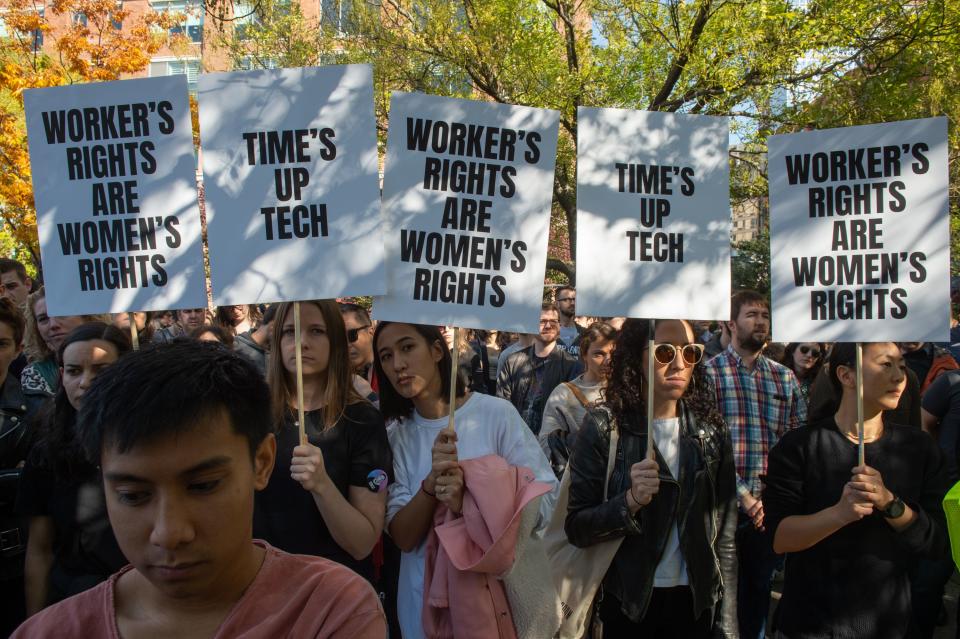Google walkout marks new direction for #MeToo, #TimesUp
A rolling protest of Google workers who walked out from the company’s offices across the globe Thursday – from Tokyo to Zurich to London to New York and on to Silicon Valley — marks a new direction for the #MeToo and #TimesUp campaigns.
Over the past 12 months, a growing outcry against sexual harassment and abuse in the workplace has toppled 201 men from positions of power, according to a dramatic graphic from the New York Times But there has been less attention paid to the institutional scaffolding that allowed those men to gain and keep power in the first place. There has also been less success in remedying workplace cultures hostile to women well south of the C-suites.

Slideshow: Worldwide Google walkout over sexual harassment, racism and pay inequality >>>
Google, where thousands of employees left their desks in more than 40 of the company’s offices Thursday morning as the clock reached 11:10 a.m. in their time zones, is not the first companywide protest by employees saying things have to chance beyond the top. McDonald’s workers walked out in 10 cities in September, for instance.
And these are not the first widespread charges of harassment, discrimination and misconduct at all levels of a Silicon Valley company. This summer, 56 Uber employees were awarded a payout in the settlement of a class-action settlement.
But Google is the largest so far — in fact the company is said to be the third most valuable brand in the world — and the cascade effect is likely to be powerful.

“It has the potential to be the start of the next wave,” said Sylvia Ann Hewlett, an economist who specializes in gender and workplace issues. “The walkout is infused with issues of social justice and corporations doing the right thing and the ethics of doing business,” all of which are embedded in #MeToo, she says, but also “an amplification of it.”
In fact these protests come as employees at Silicon Valley giants are increasingly pushing back against the involvement of their employers in projects that employees consider ethically questionable. At Google and Microsoft, the pressure was against providing cloud computing services to the Department of Defense, while at Amazon 450 employees signed a letter asking Jeff Bezos to stop selling facial recognition software to law enforcement agencies because tests show the false recognition rate to be higher among people of color. Employees have also questioned use of Silicon Valley products in the separation of children from their families at the border, and developing a censored search engine for China.
The grievances in Thursday’s Google protests are more about internal culture than outward business choices. The boiling point for employees appears to have been reached after a New York Times article last week detailed the way the company essentially forgave and hid the accusations of sexual misconduct that led to the departure of Android creator Andy Rubin back in 2014, allegedly paying him $90 million. He was one of three senior executives protected by the company, the Times said.
Among the demands issued by protest organizers are: “an end to forced arbitration in cases of harassment and discrimination, a commitment to end pay and opportunity inequality; a publicly disclosed sexual harassment transparency report; a clear, uniform, globally inclusive process for reporting sexual misconduct safely and anonymously; a diversity officer to answer directly to the CEO and make recommendations directly to the board of directors” and the appointment of “an Employee Representative to the Board.”

The walkout at Google is additionally significant, Hewlett said, because the company has “earned a reputation for being the most cutting-edge employer in the world. It is remarkably thoughtful in terms of how it hires and how it orchestrates the work culture.”
As the walkout organizers said in their statement: “From the moment we start at Google we’re told that we aren’t just employees; we’re owners. Every person who walked out today is an owner, and the owners say: Time’s up.”
The fact that this carefully constructed workforce is now openly rebelling, Hewlett says, “is profoundly shocking. The effects of this will be ricocheting around the world.”
Read more from Yahoo News:
Ex-Obama official: U.S. ‘very vulnerable’ to power grid cyberattack from Russia
Leading for-profit prison and immigration detention medical company sued at least 1,395 times
Over nearly a century, Rose Mallinger saw the best and worst of America. Until Saturday.
Photos: Worldwide Google walkout over sexual harassment, racism and pay inequality


